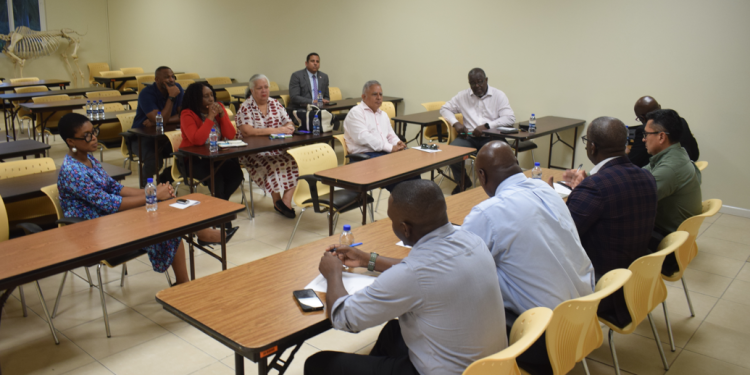There are growing concerns among public and private sector officials in Antigua and Barbuda over the recent announcements from the Trump Administration that it is imposing tariffs on practically every country in the world, even though respective countries will pay different rates.
Even as the Trump Administration has announced a 90-day pause on some of the tariffs, there remains in place a 10-percent tariff on goods coming from most countries, including Antigua and Barbuda.
President of the Antigua and Barbuda Chamber of Commerce, Mario Colindres hosted the regional trade experts and business leaders who are sounding the alarm over rising shipping costs and looming economic disruption, as international sanctions threaten to strain supply chains and trade routes across Latin America and the Caribbean.
Gathering at the American University of Antigua last week, representatives from the shipping industry, customs, consumer affairs, and diplomatic corps from surrounding countries addressed the growing pressures on small island states like Antigua and Barbuda. The session, convened by the Executive Director of the Chamber of Commerce, Martin Cave focused on the fallout from unilateral international sanctions by the United States government, and the urgent need to consider diversifying trade relationships as a viable option.
Among the issues raised were again the increasing cost of freight, the implications of new carbon taxes from the International Maritime Organization (IMO), and the risks associated with importing goods from less familiar markets.
Deputy Comptroller of Operations at the Customs David Martin said that while tariffs remain steady, shipping companies would be independently raising prices—passing increased operational expenses onto importers and, ultimately, consumers.
Tamara Lowe-James, Island Manager for Tropical Shipping, cited higher production costs for shipping agencies as the main reason behind elevated shipping charges, even though customs tariffs have not changed.
Port Manager Darwin Telemaque painted a bleak picture of the road ahead. “Ports are becoming as crucial as the power grid and data centers,” he said, stressing the need to rethink port efficiency and productivity to cushion consumers from skyrocketing costs. “We should take a hard look at the ecosystem and try to find ways to mitigate the expenses.”
If the U.S. implements measures against Chinese-built ships, “it’ll be worse than the COVID-19 pandemic worse than a hurricane,” he warned, calling for urgent reforms to avoid economic catastrophe.
Orrin Steele, from the Prices and Consumer Affairs Division, said the cascading impact of sanctions could lead to unaffordable prices for basic goods. “I don’t know what’s going to happen in the next six months based on all those charges that may come. We are a small island and we don’t have certain powers to curtail these things.”
There were calls for Antigua and Barbuda to explore becoming a regional logistics hub and for the government to petition CARICOM for tariff exemptions on essential goods.
“Our allies that kept us safe are not interested in doing that anymore,” Telemaque stated, suggesting that Caribbean nations must now look inward for solutions.
Luis Enrique Reynon, The First Secretary Embassy to the Dominican Embassy echoed the sentiment. He called for stronger economic ties between the DR and CARICOM countries. “It is important that governments sit together and make decisions that benefit the Caribbean as one economic bloc,” he said, highlighting the DR’s strategic position between the Caribbean and South America.
The DR is well placed between the Caribbean and South America but there is a disconnection between CARICOM countries and DR, he said.
Kevin Rogers, Chief Operating Officer at Go To Enterprises added that while the company brings in some goods through the DR, most shipments still pass through South Florida. “Everything goes through Miami” which means that any sanctions would greatly impact its business.
The consensus at the forum was clear: the Caribbean must act swiftly and collaboratively to insulate its economies from the knock-on effects of sanctions and reimagine trade to ensure stability and sustainability for the future.



